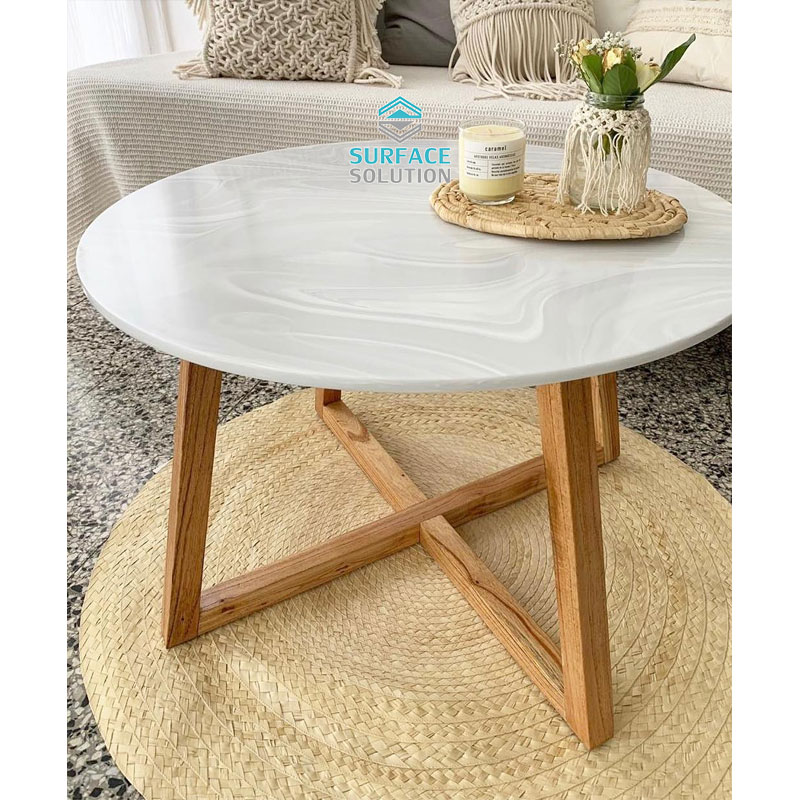Solid surface countertops have become a popular choice for homeowners seeking a balance between beauty, durability, and functionality. Unlike natural stone or laminate options, solid surface materials offer unique advantages that make them an attractive investment for kitchens, bathrooms, and other high-use areas throughout your home.
This comprehensive guide will explore everything you need to know about solid surface countertops, from their composition and benefits to installation considerations and maintenance requirements. Whether you're renovating your kitchen or building a new home, understanding these versatile surfaces will help you make an informed decision for your space.
What Are Solid Surface Countertops?
Solid surface countertops are engineered materials made from a blend of acrylic polymers, polyester resins, and natural minerals. This combination creates a non-porous, homogeneous material that maintains consistent color and pattern throughout its entire thickness.
The manufacturing process involves mixing these components under controlled conditions, then casting or molding them into sheets of varying thicknesses. The result is a smooth, seamless surface that can be fabricated into virtually any shape or size to fit your specific design needs.
Popular brands in the solid surface market include DuPont Corian, LG HI-MACS, and emerging options like Letu surface, which offers competitive quality and design flexibility for modern applications.
Key Benefits of Solid Surface Materials
Seamless Integration
One of the most significant advantages of solid surface countertops is their ability to create seamless installations. Unlike tile or natural stone, these materials can be joined invisibly, creating the appearance of one continuous surface even across large areas or complex shapes.
Repairable and Renewable
Minor scratches, burns, or stains can often be sanded out and polished away, restoring the original appearance. This repairability extends the lifespan of your countertops significantly compared to materials that show permanent damage.
Design Versatility
Solid surface materials come in hundreds of colors and patterns, from solid colors to designs that mimic natural stone, wood, or abstract patterns. This variety allows you to match virtually any design aesthetic or color scheme.
Hygienic Properties
The non-porous nature of solid surface countertops means they don't harbor bacteria or require sealing like natural stone surfaces. This makes them particularly suitable for food preparation areas and healthcare environments.
Design Applications and Possibilities
Kitchen Applications
Solid surface excels in kitchen environments where functionality meets style. The material can be thermoformed to create integrated sinks, drainboards, and backsplashes that flow seamlessly with the countertop surface. This integration eliminates joints where food particles and bacteria might collect.
Bathroom Installations
Bathrooms benefit from solid surface's moisture resistance and design flexibility. Vanity tops, shower surrounds, and even bathtub surrounds can be fabricated from the same material, creating a cohesive, spa-like environment.
Commercial Uses
Beyond residential applications, solid surface materials are widely used in restaurants, hospitals, laboratories, and retail environments where hygiene, durability, and easy maintenance are essential.

Installation Considerations
Professional Installation Requirements
While some DIY enthusiasts might consider installing solid surface themselves, professional installation ensures proper fit, seamless joints, and warranty compliance. Certified fabricators have specialized tools and training to handle the material's unique properties.
Substrate Preparation
Proper substrate preparation is crucial for solid surface installation. The underlying cabinets or support structure must be level, stable, and adequately supported to prevent flexing that could cause cracks or joint failure.
Template Creation
Accurate templating is essential, especially for complex layouts with appliances, sinks, or unusual angles. Professional fabricators typically create precise templates to ensure perfect fit during installation.
Maintenance and Care
Daily Cleaning
Routine maintenance involves simple cleaning with mild soap and water or standard household cleaners. The non-porous surface doesn't require special treatments or harsh chemicals for regular upkeep.
Addressing Minor Damage
Small scratches or minor burns can be removed using fine sandpaper and polishing compound. For deeper damage, professional restoration may be necessary, but the material's repairability means most issues can be resolved without replacement.
Long-term Care
Unlike natural stone surfaces that require periodic sealing, solid surface countertops maintain their protective properties without additional treatments. This low-maintenance characteristic makes them particularly appealing for busy households.
Comparing Costs and Value
Initial Investment
Solid surface countertops typically fall in the mid-range price category, costing more than laminate but less than premium natural stone options. The exact cost varies based on brand, color selection, edge treatments, and installation complexity.
Long-term Value
The combination of durability, repairability, and timeless design options makes solid surface a sound long-term investment. Unlike trendy materials that may look dated in a few years, quality solid surface installations can maintain their appeal for decades.
Return on Investment
Kitchen and bathroom renovations featuring solid surface countertops typically provide good return on investment when selling a home, as buyers appreciate the combination of beauty and practicality these surfaces offer.
Making the Right Choice for Your Home
Choosing solid surface countertops involves considering your lifestyle, design preferences, and budget. These materials work particularly well for families who want beautiful, low-maintenance surfaces that can withstand daily use while maintaining their appearance over time.
When evaluating options, consider factors like color consistency, warranty coverage, and local fabricator expertise. Brands like Letu surface offer competitive alternatives to established names, often providing similar quality and performance at more accessible price points.
Your decision should also account for the specific demands of your space. High-traffic kitchens may benefit from solid surface's repairability, while design-focused installations might prioritize the seamless aesthetic possibilities these materials provide.
Solid surface countertops represent a mature, proven technology that continues to evolve with new colors, patterns, and performance improvements. By understanding their capabilities and limitations, you can determine whether this versatile material aligns with your renovation goals and lifestyle needs.
solid surface
solid surface countertops
solid surface shower walls
English
العربية
Français
Português
Deutsch
日本語
한국어
Nederlands
Tiếng Việt
ไทย
Polski
ພາສາລາວ
ភាសាខ្មែរ
Bahasa Melayu
ဗမာစာ
Filipino
Bahasa Indonesia
magyar
Română
Čeština
Монгол
қазақ
Српски
فارسی
Kiswahili
Slovenčina
Slovenščina
Norsk
Svenska
українська
Ελληνικά
Suomi
Հայերեն
עברית
Dansk
Shqip
Hrvatski
Gaeilge
Eesti keel
latviešu
Azərbaycan dili
Беларуская мова
Български
ქართული
ʻŌlelo Hawaiʻi
Wikang Tagalog




















